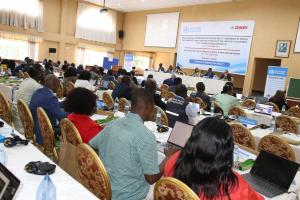WHO African countries convene ahead of the 10th Conference of Parties to the WHO FCTC and 3rd Meeting of Parties to the Protocol to secure regional consensus on key decisions at the tobacco control conferences
Entebbe, 24th – 27th October 2023 - The World Health Organization (WHO) Regional Office for Africa (AFRO) in collaboration with the Secretariat of the WHO Framework Convention on Tobacco Control (WHO FCTC) has completed a four-day Africa regional preparatory meeting for the 10th session of the Conference of Parties (COP 10) to the WHO FCTC and the 3rd meeting of the parties to the protocol to eliminate illicit trade in tobacco products (MOP3).
The meeting brought together 160 participants from 47 WHO member states in Africa and regional civil society organizations involved in tobacco control. It aimed to secure regional consensus on key decisions ahead of the two tobacco control conferences (COP 10 and MOP 3) scheduled to take place in Panama City from November 20-25 and 27-30 respectively.
Speaking during the opening session, Dr Jane Aceng Ocero, Minister of Health in Uganda stressed that tobacco use is a major contributor to increased incidence of non-communicable diseases deaths, and disability globally. “Each year, over 8 million people die from tobacco use-related diseases and nearly 1.2 million of them are second hand smokers.”
Moreover, the use of tobacco products creates significant negative externalities translating into higher direct health costs associated with tobacco-related diseases, and indirect costs associated with premature loss of life, disability, and productivity losses.
“Uganda has banned all forms of advertising, promotion, and sponsorship of tobacco products and also banned smoking in all public places under the Tobacco Control Act 2015. We have strengthened the multisectoral enforcement which has reduced the number of smokers in public places," Dr Jane added.
The preparatory meeting also reviewed progress made in the implementation of tobacco control in Africa.
"Building consensus on regional positions on tobacco control and assessing the progress made by WHO Member States in Africa in this regard, will enable us to accelerate the implementation of our agreement to eliminate illicit trade in tobacco products,” said Dr Yonas Tegegn Woldemariam, WHO Representative to Uganda.
The adoption of the WHO Framework Convention on Tobacco Control in 2003 was a landmark victory for public health. WHO member states represented pledged to express the supremacy of public health concerns over economic interests. To date, 183 member states, including 45 from the WHO African region, are parties to the treaty.
The 2003 Framework Convention on Tobacco Control is governed by the Conference of the Parties, which reviews its implementation. So far, nine sessions have been held, with the last one which took place virtually from November 8 to 13, 2021, due to the COVID-19 pandemic.
The first protocol to the WHO FCTC, is the Protocol to eliminate illicit trade in tobacco products which was adopted by the Conference of Parties in Seoul, Korea, in November 2012. It entered into force on October 1, 2018, after obtaining the necessary 40 ratifications and accessions. By May 2023, the protocol had 67 Parties and 54 signatories, with 22 Parties from the WHO African Region. The Protocol is still open for ratification by signatories and accession by non-signatories.
Successes in the implementation of this convention in the region are already visible. Through the tobacco-free farm initiative implemented in Kenya, over 4500 farmers have shifted from growing tobacco to alternative livelihoods including farming of high irons-beans.
The subnational and multisectoral levels of enforcement to promote a smoke-free environment in Uganda and Ethiopia, and the increment in tobacco taxes in Gambia are consecutively good steps to reduce the prevalence of tobacco consumption in the country.
"The tobacco industry has continuously interfered with policies for tobacco control which slows down our efforts to save lives. I am sure they will try to interfere with the decisions we have made in this meeting and in the Conference in Panama,” explained Dr Onyango Adelheid, the Director of the UHC- Healthier Populations Cluster at the WHO Regional Office for Africa.
He further encouraged countries to remain solid on the consensus to implement the Framework Convention on Tobacco until tobacco no longer imposes any threat to mankind. “Countries should learn from and leverage efforts made by others to combat tobacco use in the region. “WHO will always provide the necessary technical support when needed," concluded Dr Adelheid.
Communications Officer
WHO Uganda
Email: tcheutchouae [at] who.int (tcheutchouae[at]who[dot]int)
Communications Associate
WHO Uganda Country Office
Email: afwcougcom [at] who.int (afwcougcom[at]who[dot]int)
Phone: +256740487734
